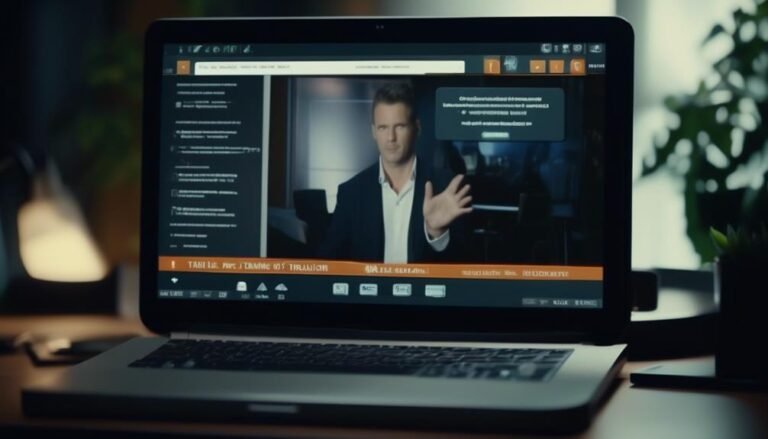Team Building Training: Strengthening the Bonds Within Your Workforce
In today's fast-paced and competitive business environment, the strength of a company lies not only in the individual skills of its employees but also in their ability to work cohesively as a team.
Team building training plays a pivotal role in fostering a sense of unity, collaboration, and mutual support within the workforce. The benefits of investing in such training are manifold, ranging from improved communication and trust to enhanced problem-solving and innovation.
However, the true value of team building training extends far beyond the surface, delving into the intricacies of team dynamics, leadership development, and conflict resolution. As we explore the various facets of team building training, the insights gained will shed light on the profound impact it can have on organizational success and employee satisfaction.
Key Takeaways
- Team building training fosters a collaborative and cohesive work environment.
- Effective team building activities improve teamwork, communication, and problem-solving skills.
- Building trust and open communication are essential for team cohesion and success.
- Leadership development initiatives enhance leadership skills, foster cohesive teams, and promote effective communication.
Importance of Team Building Training
Team building training plays a crucial role in fostering a collaborative and cohesive work environment, ultimately leading to improved productivity and employee satisfaction. Employee engagement is a vital aspect of any successful business, and team building training is an effective way to promote this engagement. Through various team-building activities, employees are encouraged to work together, communicate effectively, and develop strong working relationships. This, in turn, leads to higher levels of motivation and commitment among team members.
Motivational workshops are an integral part of team building training. These workshops are designed to inspire employees, boost morale, and encourage a positive mindset. By participating in motivational workshops, employees are empowered to set and achieve their goals, both individually and as part of a team. This not only enhances their sense of belonging within the organization but also fuels their passion for their work. As a result, employees become more invested in the success of the company, leading to increased productivity and a more positive work environment.
Key Benefits for Your Workforce
A well-implemented team building training program can yield significant benefits for your workforce, enhancing collaboration, communication, and overall performance.
The key benefits for your workforce include:
- Employee Engagement: Team building activities foster a sense of belonging and purpose among employees, leading to increased engagement with their work and the company as a whole.
- Productivity: By improving teamwork and communication, team building training can lead to a more efficient and productive workforce, resulting in higher output and quality of work.
- Morale Boost: Engaging in team building activities can boost morale by creating a positive and enjoyable work environment, leading to happier and more motivated employees.
- Employee Retention: A workforce that feels connected and valued is more likely to remain loyal to the company, reducing turnover and the associated costs of recruitment and training.
Understanding Team Dynamics
After considering the key benefits for your workforce resulting from a well-implemented team building training program, it is essential to comprehensively understand the dynamics that drive effective teamwork within an organization.
Team dynamics encompass the interactions, behaviors, and relationships among team members. Understanding group behavior is crucial for fostering a positive and productive work environment.
Conflict resolution is an integral part of team dynamics, as conflicts are inevitable in any group setting. Effective conflict resolution strategies, such as open communication and mediation, are essential for maintaining team cohesion.
Team cohesion refers to the ability of a team to work together seamlessly towards a common goal. It is influenced by various factors, including trust, shared values, and a sense of belonging.
By comprehending team dynamics, organizations can identify strengths and weaknesses within their teams, implement strategies to enhance collaboration, and create a supportive and harmonious work environment.
This understanding is fundamental for building strong, high-performing teams that contribute to the overall success of the organization.
Effective Team Building Activities
Effective team building activities are an essential component of fostering a cohesive and productive team.
Engaging in fun team activities helps to break down barriers and build camaraderie among team members.
Additionally, activities that focus on communication, trust, and problem-solving challenges are crucial in strengthening the bonds within the team.
Fun Team Activities
What are some engaging and effective team building activities that can promote collaboration and communication among team members?
- Outdoor Adventure: Activities such as hiking, ropes courses, or kayaking can foster trust and teamwork in a natural setting.
- Creative Workshops: Engaging in art, music, or cooking workshops encourages creativity and problem-solving while building camaraderie.
- Escape Rooms: Solving puzzles and challenges in a themed room requires teamwork, communication, and quick thinking.
- Community Service: Volunteering together for a cause can strengthen bonds while making a positive impact on the community.
Engaging in these activities can break down barriers, encourage open communication, and create lasting connections among team members, leading to a more cohesive and productive workforce.
Communication and Trust
How can effective team building activities promote trust and open communication among team members in the workplace?
Building rapport and fostering connections are essential components of effective team building activities. By engaging in activities that encourage teamwork, collaboration, and open communication, team members can develop a greater sense of trust and understanding. This can lead to improved relationships, better conflict resolution, and enhanced problem-solving abilities within the team.
Team building activities that require clear and effective communication, such as problem-solving challenges or group discussions, can help team members learn how to communicate openly and respectfully. Moreover, when team members feel connected and supported by their colleagues, they are more likely to share ideas, provide feedback, and work together towards common goals, ultimately strengthening the overall effectiveness of the team.
Problem-Solving Challenges
To further foster trust and open communication among team members, engaging in problem-solving challenges can provide an effective platform for collaborative learning and skill development within the workplace.
Collaborative problem solving and interactive team challenges not only encourage employees to work together towards a common goal, but also help in breaking down communication barriers and building mutual respect.
These activities offer a sense of accomplishment and boost morale, leading to a more positive and cohesive work environment.
Through facing and overcoming challenges as a team, individuals develop a deeper understanding of each other's strengths and weaknesses, fostering a culture of support and cooperation.
Additionally, problem-solving challenges promote creative thinking and innovation, allowing teams to explore diverse perspectives and approaches to finding solutions.
Communication and Trust Building
In the context of team building, effective communication and trust are crucial for success.
Active listening techniques equip team members to understand each other's perspectives, fostering an environment of empathy and respect.
Open and honest dialogue promotes transparency and helps to resolve conflicts.
Building collaborative relationships encourages teamwork and unity within the group.
Active Listening Techniques
When cultivating effective team communication and building trust, mastering active listening techniques is paramount. Active listening fosters employee engagement, enhances effective communication, and promotes team collaboration.
To achieve this, consider the following emotional responses:
- Empathy: Active listening shows that you genuinely care about your team members' thoughts and feelings.
- Respect: By actively listening to your colleagues, you convey respect for their opinions and perspectives.
- Trust: Building trust within the team is facilitated when team members feel heard and understood.
- Connection: Active listening helps create a deeper connection among team members, leading to a more cohesive and supportive work environment.
Open and Honest Dialogue
Mastering active listening techniques, particularly in cultivating empathy, respect, trust, and connection, sets the foundation for open and honest dialogue, essential for effective communication and trust building within a team.
Open communication is crucial for fostering an environment where team members feel comfortable expressing their thoughts, ideas, and concerns. It encourages transparency and allows for the free flow of information, leading to a deeper understanding among team members.
When team members engage in open and honest dialogue, it builds trust as it demonstrates a willingness to be vulnerable and authentic. This, in turn, fosters a sense of unity and cohesion within the team.
Building Collaborative Relationships
Effective communication and trust building are integral to establishing collaborative relationships within a team. When it comes to building these relationships, the following factors play a crucial role:
- Active Listening: Encouraging team members to truly listen to one another fosters understanding and empathy.
- Transparency: Openly sharing information and being transparent about decisions helps to build trust within the team.
- Empathy and Respect: Cultivating an environment where team members show genuine care and respect for each other's opinions and feelings enhances collaboration.
- Collaborative Problem Solving: Engaging in problem-solving activities as a team helps in developing a sense of unity and shared purpose.
Through relationship building exercises and collaborative problem-solving, teams can strengthen their bonds, leading to a more cohesive and productive workforce.
Leadership Development Initiatives
As organizations strive to cultivate effective leadership, they often implement various development initiatives to enhance the skills and capabilities of their leaders. Leadership development initiatives play a crucial role in shaping the effectiveness of teams and the overall organizational culture. These initiatives encompass a range of activities, such as mentorship programs, leadership workshops, executive coaching, and formalized leadership training. By investing in these initiatives, organizations aim to foster a cohesive and high-performing leadership team, ultimately leading to improved team effectiveness and a positive impact on the organizational culture.
Effective leadership development initiatives not only focus on honing individual leadership skills but also emphasize the importance of collaborative leadership. They encourage leaders to build strong, cohesive teams through effective communication, strategic delegation, and fostering a culture of trust and accountability. Furthermore, these initiatives often incorporate feedback mechanisms and performance evaluations to track the progress of leaders and provide targeted support for their development needs.
Overcoming Challenges and Conflict
In navigating the complexities of organizational dynamics, developing strategies to address challenges and resolve conflicts is essential for fostering a productive and harmonious work environment. Conflict resolution is a critical aspect of building resilience within a team, and it requires a proactive and empathetic approach. Here are some key strategies for overcoming challenges and conflict in the workplace:
- Open Communication: Encouraging open and honest communication allows team members to express their concerns and viewpoints, fostering understanding and collaboration.
- Active Listening: Actively listening to the perspectives of others demonstrates respect and empathy, leading to more effective problem-solving and conflict resolution.
- Constructive Feedback: Providing constructive feedback in a respectful manner helps address issues and challenges while maintaining positive working relationships.
- Conflict Mediation: Implementing a formal conflict mediation process can help facilitate constructive dialogue and resolution, ensuring that conflicts are addressed in a fair and unbiased manner.
Sustaining Team Cohesion
To maintain team cohesion, it is imperative to establish clear and transparent communication channels that facilitate the exchange of ideas and foster a sense of unity among team members.
A cohesive team is more likely to experience increased employee retention, as members feel a stronger sense of belonging and are motivated to contribute to the team's success.
Building trust is fundamental in sustaining team cohesion. When team members trust one another, they are more willing to collaborate and support each other, leading to a more cohesive and productive work environment.
Fostering relationships within the team is also crucial for sustaining cohesion. Encouraging team-building activities, mentorship programs, and open discussions can help cultivate strong interpersonal connections, thereby strengthening the bonds among team members.
Conclusion
In conclusion, team building training plays a crucial role in fostering a cohesive and efficient workforce.
By addressing the dynamics of teamwork, communication, trust, and leadership, organizations can overcome challenges and conflicts, ultimately sustaining a strong team cohesion.
As we continue to explore the intricacies of team dynamics and the impact of effective team building activities, it becomes evident that investing in such training is essential for the growth and success of any organization.







